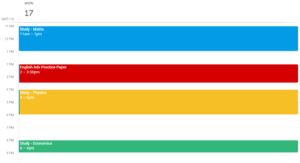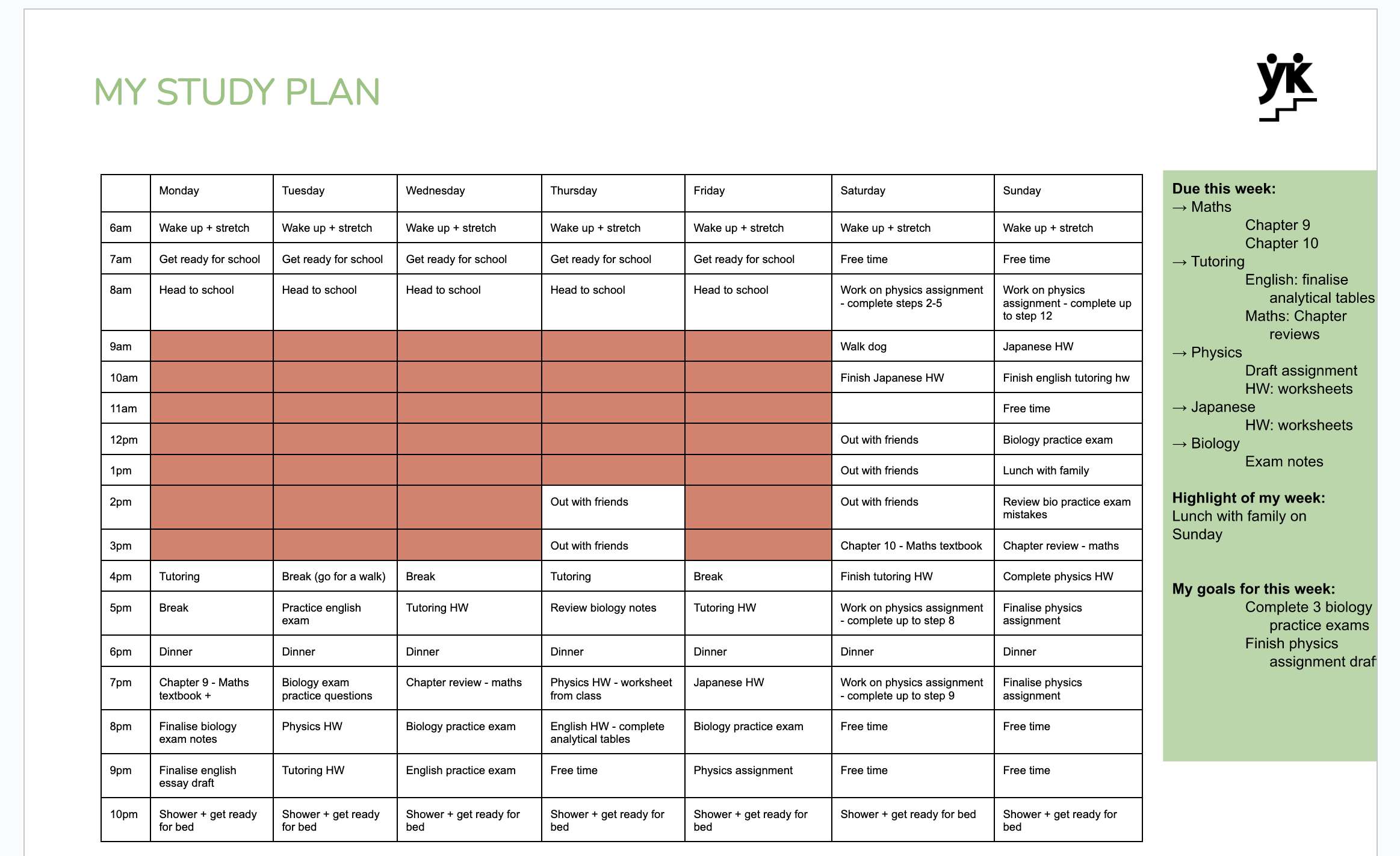
- 3 min read
How to beat the feeling of being overwhelmed using a study plan

Ian
Ex-tutor & HSC Band 6 All Rounder @YK Education
As a student in high school, the numerous assessments, assignments and deadlines can really add up which all culminates in the common experience of feeling overwhelmed. With so many tasks to do, the workload piling up, it’s completely normal to feel helpless and unsure where to begin. However, a study plan pays dividends in beating this feeling.
A study plan helps students stay organised and efficient with their time by highlighting tasks that need to be completed, break down work into manageable chunks and have a degree of control. By creating one, students can control their workload and make progress towards their academic goals. Ultimately, a study plan is a powerful way for students to beat the feeling of being overwhelmed.
For a study plan to be effective, understand what specific tasks are important to start by identifying the specific tasks that need to be completed. This might include readings, assignments, and study sessions. Depending on the urgency and importance of the task, students can prioritise the tasks to be completed and the necessary time to complete them. It’s also important to factor in any deadlines or commitments, such as exams or extracurricular activities.
Once the tasks have been identified and prioritised, students can start breaking them down into smaller, more manageable steps. This might involve setting specific goals for each study session or breaking down larger assignments into smaller components. By breaking tasks down in this way, students can avoid feeling overwhelmed and start making steady progress toward their goals.
In this article, we will explore why study plans are able to help, why study plans fail, and how to write a study plan that actually works. We’ll provide practical tips for creating an effective study plan, managing time effectively, and staying motivated throughout the academic year. With the right approach, students can overcome feelings of being overwhelmed and achieve their full potential.
Why do study plans help?
Study plans help you keep accountable about your learning goals and outlines a comprehensive methodology to deal with preparation, planning, and problems faced in each subject. Typically, a study plan involves setting goals that are realistic and achievable. In doing so, by breaking down your learning objectives into smaller milestones, you can track your progress and stay motivated.
Similarly, a study plan can help you prioritise your work by identifying the most important or challenging topics and allocating more time to them. This can help you make the most of your study time and avoid cramming at the last minute.
Study plans can also help with effective time management. Time management is already difficult, balancing school work with your social life, part-time/casual work and other extracurricular activities. Creating a study plan allows you to see how you spend your time and how to be most efficient and effective with it.
Why do study plans fail?
Oftentimes it can be difficult to stick to your study plan and this could be due to a number of various reasons.
Below are some of the most common mistakes when creating a study plan:
● Not including everything into the calendar/ not detailed enough
● Not adding buffer time
● Underestimating the time it takes to complete a task (always overestimating)
● Not including daily tasks
● Setting unrealistic expectations
● Not including breaks
● Too rigid and is not easily adaptable to changes
How to write a study plan that actually works – the YK Method
There are many ways to create a study plan and the best option will vary from person to person depending on factors.
Here are Yuna’s suggested steps that have worked for past YK students.
Basic steps:
Step 0 – Preparation:
Before you make a proper study plan, ensure you make a fixed weekly schedule template that can be revised as necessary e.g. during exam periods, every term, or when you start new commitments.
Evaluate your current schedule and time management to make your personal schedule template. Block in parts of your schedule that cannot be changed into your study plan (e.g. work, sleep/rest, sport).
This will let you see how much of your time is already taken, and how much time you have available for studying. Finally, if your schedule is really packed and leaves little room for studying, you may need to reevaluate some of your commitments or rearrange your schedule to allow yourself to have more time available for studying.
Remember, you are a full-time student so make sure you treat yourself like one!
Another important step in preparation is to analyse your current study habits and learning style. Ask yourself, are you able to study for long blocks of time once or twice a day, or is it more effective if you study for short periods of time? Are you more productive at a certain time of day? Do you retain content immediately after school, or do you need a break first? By asking yourself these questions, you will be able to understand the best way to create an effective study plan.

Step 1 – Evaluate your schedule once a week
On Sunday (or once a week that suits you), evaluate your schedule for the week including social events such as birthday parties, irregular activities such as study workshops and insert them into the schedule template to block out those times. It’s important that you set aside time and assess what you have in the coming week, and adequately prepare yourself for the activities.
Step 2 – Fill out your recurring tasks
Put into your study plan tasks that you will have to always do throughout the week. For example, these tasks could be in the form of vocabulary quizzes or reading revision notes. These usually will not change in the study schedule but remember to decide what exactly to do in those recurring task times.
Step 3 – List all the tasks that must be finished this week
The third step should be to list all the different tasks you need to complete in that week. When you do so, organise them into your studying related tasks, as well as, additional personal tasks such as cleaning your room, doing the dishes and throwing out the garbage in a to-do list.
Further actions you should do:
- Estimate how long each task will take (if you are unsure, a good rule of thumb is to always overestimate).
- Level the tasks in order of difficulty (for you) and motivation level (for you).
Step 4 – Fill it into the study plan in line with urgency
Once you have listed all the necessary tasks to be completed, you should fill them into your study plan and highlight the urgency to which they should be completed. For example, what should be done on the next day, next week or next month. This will help you in your task priorities.
Step 5 – Evaluate effectiveness of the study plan and analyse what worked/what didn’t
Now that you have established your study plan, figure out how effective it actually is. Have you been able to complete your tasks to a high standard and in a timely manner? Figure out and analyse what worked and what didn’t to achieve the study plan that is best for you.
Step 6 – Customise for your personality type.
Type 1: “I want to be told exactly what to do”
Type 1 students may benefit from using applications such as Google Calendar to time block or study templates such as:

Type 2: “I don’t like rigid plans and want flexibility”
Type 2 students may benefit from using applications such as Asana to easily change and adapt their schedule using a to-do list. As long as the tasks are completed by the end of the week, we can prioritise flexibility.
Now, let’s make a schedule together:
1. Study schedule template on Google Doc + print or digital
2. Insert types of activities (read, listen, flashcards, maths questions, essay writing etc) in the available time slots (e.g. travel time, before school, while exercising)
3. List recurring tasks on Google Doc
4. List all the tasks that must be finished this week
5. Break them up into 30-1h intervals, order of priority/difficulty/motivation
6. Insert tasks in the schedule template and/or split the tasks into days
7. Insert the tasks into todoist or asana + Google Calendar – push notifications??
Useful apps and examples
- Asana
- Google Calendar
- Google Keep
- Momentum
- Forest
- Chrome Extension: BlockSite
Conclusion
Take these tips on board next time you create a study plan and/or if you already have one, how to adapt it to cater best for your needs. Hopefully by creating an effective study plan, you will overcome any feelings of being overwhelmed and become the best academic version of yourself!

